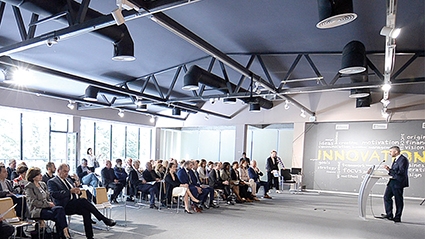EU-World Bank Project Launched to Support the Innovation Economy
A new project was launched last week to support Georgia’s Innovation and Technology Agency (GITA) by building institutional capacity. The project, titled ‘Increasing Institutional Capacity for Innovation’ (IICI), is supported jointly by the European Union and the World Bank. The European Union will provide 2.7 million EUR in funding for the project, which will be implemented by the World Bank.
On Thursday, May 16, a launch event was held at Tech Park Georgia in Tbilisi’s Okrokana district. The opening remarks were delivered by recently appointed Deputy Minister of Economy and Sustainable Development Nikoloz Alavidze, World Bank Regional Director for the South Caucasus Mercy Tembon, and First Secretary of the Delegation of the European Union to Georgia Stig Kjeldsen.
“The World Bank is proud to continue to stand by GITA as it transforms from a young ‘startup’ agency into a mature framework for Georgia’s coordination of its innovation and entrepreneurship policy and practice,” said Tembon. She added, “With support from the EU, and the Bank’s technical assistance, this project will allow GITA to take the next step toward greater institutional capacity and effectiveness, test the potential for technology transfer, and improve opportunities for investing in innovative, early stage companies in Georgia.”
Speaking to the audience, Kjeldsen affirmed the European Union’s enthusiastic support for the project, saying "Innovation increases SME competitiveness and creates jobs, and innovation policy is actually at the heart of the EU’s own Europe 2020 strategy for growth and job creation…Further assisting GITA in building Georgia's innovation ecosystem falls naturally in line with the EU’s commitment to supporting business development in Georgia."
The overall objective of the project is to increase GITA’s internal capacity to develop and implement sustainable, impactful innovation and entrepreneurship policies and programs; test and demonstrate the viability of technology transfer between educational institutions and the private sector in Georgia; improve the deal flow of innovative start-ups ready for investment, and fund availability for early-stage companies. The European Union expects the IICI project to generate what they call “important results,” including easier access to support and finance for small and medium enterprises (SMEs) and innovative companies, a more coherent public approach to supporting entrepreneurs and SMEs, and an overall increase in innovative economic activity.
In his remarks, Alavidze thanked the World Bank and the European Union for investing in innovation in Georgia. “We need more initiatives to promote an innovation ecosystem in Georgia, to encourage innovative companies and researchers to be able to monetize their own technological ideas and then sell them in commercially profitable products. Thus, the implementation of this project will be positively reflected on the economic growth process,” the deputy minister said.
GITA currently operates several projects and initiatives, including FabLabs (fabrication laboratories) and ILabs (innovation laboratories) across the country, a business incubator, and innovation-focused youth camps. Tech Park (also referred to as Technopark) is one of GITA’s flagship projects. It offers FabLabs and co-working spaces to the public, designed to be a physical space for technological, educational, and professional resources to accumulate to support the development of a knowledge-based economy.
By Samantha Guthrie
Image source: Ministry of Economy and Sustainable Development











